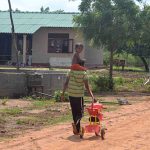Labour Of Love:
The Talaimannar Woman Who Teaches Weaving – And Economic Cooperation
A 53-year-old woman in remote northern Sri Lanka is teaching her village to weave flax baskets. The exercise has seen locals cooperating in a unique way.
For K. Muttamma, this traditional village craft is a labour of love – love for her family, who she supports weaving baskets and boxes out of flax leaves from Sri Lanka’s distinctive palmyrah tree, day and night. And love for the other women in her village in the remote Talaimannar area in north-western Sri Lanka, who she teaches to weave for free.
Muttamma has three adolescent daughters and her husband, who used to earn the family’s living, fishing and making palm wine – also known as toddy tapping – has been unable to work for the past five years.
I love to see the girls here able to earn their own living. It makes them happy.
“But he is the one who asks the toddy tappers to bring me the palm leaves,” the 53-year-old flax weaver points out.
“I wake up at three in the morning and start weaving then,” Muttamma describes her long day. “Some days I have woven two boxes by 10 or 11 in the morning. And I can earn SLR600 [around EUR3.60] with those. Two years ago, I used to weave by the moonlight but my eyesight got worse and now I cannot. If I use kerosene lamps, then all I am doing is spending the money I earn from weaving on kerosene.”
Muttamma makes about SLR15,000 per month [around EUR89] for her family this way. Although the boxes she makes fetch around SLR600 in the shops, the buyers from the stores will only pay her about half of that.
Weaving with leaves of the palmyrah tree, plentiful in northern Sri Lanka, is a time consuming and labour intensive process. After the leaves are collected some are dyed, before they are woven: Hats, baskets, boxes and mats are commonly made from the palmyrah leaves.
This kind of weaving is centuries old and the skill is usually passed on through families. Muttamma says her mother taught her how to weave and that her mother learned the skill from her grandmother.
Muttamma’s tools for weaving are also inherited and they have become smooth after generations of women have handled them.
Muttamma has not kept these skills to herself. A skilled weaver who can make everything from tiny bags for palm sugar to the huge sacks used for storing dried fish that are as big as four men, Muttamma has been teaching other women in the village more about weaving.
When The Catamaran visited Muttamma, there were around 50 other women sitting around her, making everything from matts to onion sacks. It’s a cooperative system: Each woman sticks to her genre of weaving, Muttamma explains, so that there is no competition and everyone can make a living with their own speciality.
“I have taught almost everybody here,” Muttamma says proudly. “I don’t mind that I am not paid for this. I love to see the girls here able to earn their own living. It makes them happy. But I think I am happier than them because of this,” she concludes smiling broadly.
Photograph: Ajith Senevirathna





